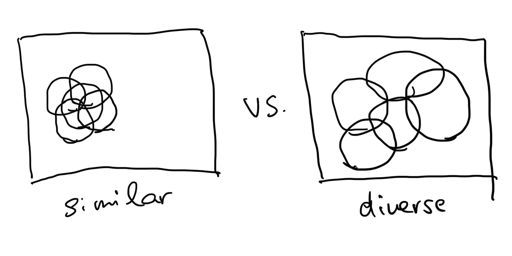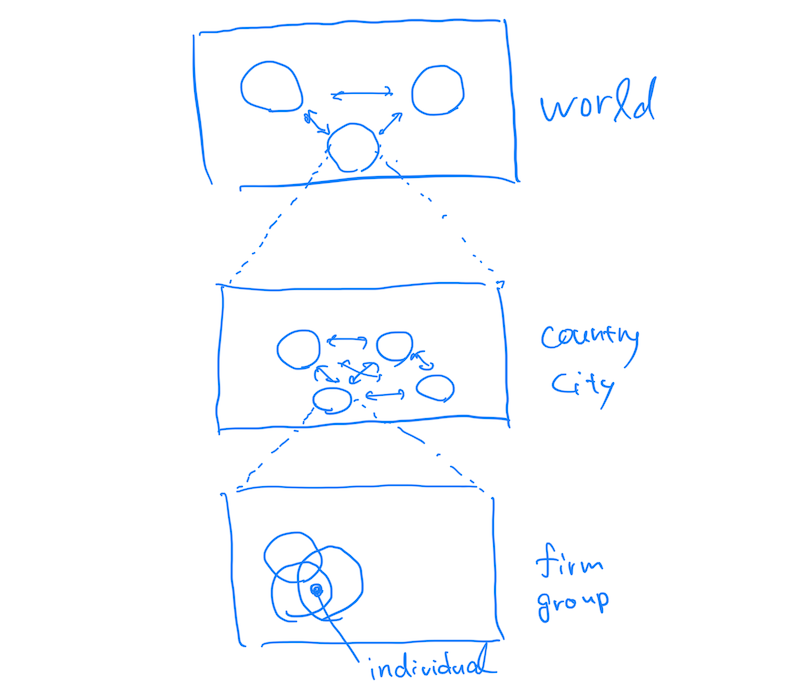Information, technology, and inherently everyone's life are highly contextualized and localized. Understanding the simple fact would bring a dramatic shift in how we see the world. In particular, reality tells us the importance of characterizing our world without suppressing the identity of its elements.
The driving force behind the world
Most importantly, there is nothing like a "united" world, and the global society is rather a set of different worlds each country, city, organization, and person holds. I consider myself a global citizen so I don't overlook the fact that we all are interconnected in some sense on this beautiful planet, but it doesn't necessarily mean the world is united at the planet scale in the political, geographical, ethnological, and/or environmental sense.
 When I fly to multiple cities across the globe, it's clear that none of them is the same, even if I focus only on a single aspect: carbon footprint.
When I fly to multiple cities across the globe, it's clear that none of them is the same, even if I focus only on a single aspect: carbon footprint.
For instance, in their awakening book Blockchain Chicken Farm: And Other Stories of Tech in China's Countryside, Xiaowei Wang showed that the uniqueness of rural China comes from the complex cultural and political background, and the situation could differ among villages and communities. Similarly, consider your home town and country. It won't take so long to realize the shape of a greater society is derived from multiplications (not summation) of individuals' smaller worlds. That is, other person's view (i.e., "resolution") of the world won't be the same as mine, and it's not a matter of technology, the hardware consisting of our daily life.
culture and community, not technology, are the driving force behind its power, its threat to the elite (Blockchain Chicken Firm, p. 237)
Simply put, the story about social aspects of technology dictates that speaking about technology with a larger subject (e.g., "China", "US", West") is pointless.
However, at the same time, the world is tightly interconnected at a macro level as I mentioned earlier, and we can order products made by a family living in a Chinese village from an urban US city, for example. Hence, each of us must acknowledge both local and global perspectives; while it's not necessarily a bad thing to have a global view of the problems and keep the desired future in mind, the only actions we can practically take is being present at this very moment and taking one step at a time.
Products bridge a gap between localized knowledge and macroeconomy
If neither micro-level overthinking nor macro-level oversimplification helps given the complexity, what degree of abstraction should we care about the most? Rethinking the shape of commercially-available products through the lens of information exchange possibly answers. To be more precise, products can be seen as an intermediate object that embodies localized, contextualized information and turns the location/person-dependent knowledge and knowhow into practical functions, as Cesar Hidalgo beautifully highlighted in Why Information Grows: The Evolution of Order, from Atoms to Economies.
In his book, Hidalgo brings the readers on a journey from a micro-level entropy discussion to a macro view of the economy. By reviewing economics and social science literature with visualizations, the book reveals that the products not only embody information but do enable the matter to compute, meaning knowledge/knowhow augments and amplifies the information. That's why information grows like a natural phenomenon through experiential and social power from the complex economic and social networks we structure. And the growth rate becomes larger in more tight-knit networks as trust in a network is a glue to maintain the links, resulting in a lower cost of inter-node transactions; links without trust require a more expensive transaction cost for communication and negotiation.
Ultimately, the discussion surfaces the fundamental limitations on the amount of information each person or organization can learn and grow, so-called personbytes or firmbytes, respectively. Therefore, diversity (# of different products exported) and complexity (average ubiquity of products) are important measures to think of, so that we don't suppress the identity of the elements in the complex networks. It reminds me of the practicality of diverse thinking.

To summarize, the origin, evolution, and use of technology and information are often location-dependent and defined by social networks. Meanwhile, the creation of commercially-available products is a way to augment localized knowledge and establish a connection to global society in the form of economic transactions. Here, trust among the network elements and respect for their identity contribute to the scalability of the complex networks. It is the foundation of the federated mechanism in the complex networks we form.
Productization as a means of cooperation
Speaking of complex systems in general, we can find similar insights in nature. In the forests, there are complex networks among trees and fungi, and they help each other based on trust (i.e., cooperation). Eventually, Mother Trees communicate with their neighbors and share localized knowledge to maintain the community.
In my opinion, the biggest difference between nature and human society is that competition is overly incentivized in our economy compared to cooperation. For this reason, I've been pessimistic about how society treats commercially-available products. But, if we purely see a product as an amplifier and transmitter of localized, contextualized knowledge, there might be a hope that the products can also intervene and change the competition-over-cooperation situation.
To begin with, we need to seriously understand that products can be either harmful or hopeful. On top of that, given the insights from the fields of economics, social science, and complexity science, there is a series of questions the creators of products can cast as part of the development lifecycle, such as why we productize, how to involve individuals not to suppress their identity, how to ensure trust in the network, which scale of "world" we consider as a component of greater society, and what kind of mechanism to embed for helping cross-community interactions.

This seems to be an inefficient approach to product development, but I strongly believe refining what user-centricity truly means is a must-step for technologists to undergo in the era of extreme complexity in information and technological advances. The components of the complex world have grown in their localized settings, and hence persona and/or user segments hardly work unless we put individuals at the center of the development flow and ourselves as a part of trust-based networks.
This article is part of the series: Productizing Data with People Ethical Product DeveloperSupport
Gift a cup of coffeeShare
Categories
Life & Reflection Society & Business
See also
- 2023-03-30
- How Information Flows: From Field Studies to Risk Mitigation
- 2022-12-04
- Data Are Created, Collected, and Processed by People
- 2022-11-03
- Connecting the Dots in Complexity
Last updated: 2022-11-19
Author: Takuya Kitazawa
I am an independent consultant, mentor, and advocate for sustainable technology development with a decade of experience in AI/ML products, data systems, and digital transformation. Based in Canada and originally from Japan, I have lived and worked globally, including part-time residence in Malawi, Africa. See CV for more information, or contact at [email protected].
NowDisclaimer
- Opinions are my own and do not represent the views of organizations I am/was belonging to.
- I am doing my best to ensure the accuracy and fair use of the information. However, there might be some errors, outdated information, or biased subjective statements because the main purpose of this blog is to jot down my personal thoughts as soon as possible before conducting an extensive investigation. Visitors understand the limitations and rely on any information at their own risk.
- That said, if there is any issue with the content, please contact me so I can take the necessary action.